 |
In this issue: - The Future of CSR Will Mirror the Health of Society: Pondering the Evolution of CSR. CSR is at the juncture of its development. CSR can become a tool of corporations to be used tactically to defuse criticism and protect their image or it can become an effective tool in truly democratic societies to make corporations socially and environmentally responsible by creating a sustainable business ethos;
- TJSGA Joins OECD Watch. TJSGA joined OECD Watch last December. OECD Watch is an international network of civil society organisations promoting corporate accountability. The purpose of OECD Watch is to inform the wider NGO community about policies and activities of the OECD's Investment Committee and to test the effectiveness of the OECD Guidelines for Multinational Enterprises;
- New 2003 Living Wage Gap Analysis Updates for Manufacturing Workers in 12 Economies and the U.S. Our research team has just completed a new set of updated analysis from 1975 to 2003, for eight developed economies and four "emerging" ones, of wage gaps in purchasing power parities terms (PPPs) using as benchmark U.S. manufacturing wages;
- Table T4 - Labour Resources 1975-2003. Update on the base table in the analysis of living wage gaps based on purchasing power parities;
- Mexico's Wage Gap. Analysis update on the huge wage gap of Mexico from 1975 to 2003, the worst of all gaps analyzed and with no signs of improvement;
- Brazil's Wage Gap. Analysis update on the huge wage gap of Brazil with available data from 1996 to 2003; a gap that has substantially grown in seven years;
- Spain's Wage Gap. Analysis update on the diminishing wage gap of Spain from 1975 to 2003; a gap which has dropped from 49% to only 11% confirms the benefits of the paradigmatic support of aggregate-demand generation;
- CogniTerra Joins TJSGA. CogniTerra, in Athens and Korfu, has joined The Jus Semper Global Alliance;
- Five Years On - A survey. The OECD Guidelines for Multinational Enterprises and Their Complaint Mechanism Earned a Resounding Flunk Evaluation by OECD Watch. The international network of civil organisations urges the creation of a legally-binding mandatory framework;
- PLEON Survey Finds Stakeholders Want Mandatory CSR Reporting of Business Practices. Yet, Companies' Key Motivation Relative to CSR is to Increase Their Reputation and Not Social Responsibility;
- Fade Integrate or Transform - The Future of CSR. Allen White, Senior Advisor to Business for Social Responsibility, Senior Fellow at the Tellus Institute and co-Founder of the Global Reporting Initiative, performs an imaginative exploration of the future of CSR, for the year 2015, and ponders about three potential scenarios, which he intentionally designed with stark differences in content and implications for companies and their stakeholders;
- Human Development Report 2005 Says that Time is Running Out!;
- Civil Society's Calendar 2006. A selection of events, relevant to TLWNSI, put together by members of organized Global Civil Society;
- Corporate Calendar 2006. A selection of events, relevant to TLWNSI, put together by business groups, multilateral institutions and governments;
- Top Resource Downloads. The top internal and external resources downloaded from our website' in 2005.
TOP
THE FUTURE OF CSR WILL MIRROR THE HEALTH OF SOCIETY: PONDERING THE EVOLUTION OF CSR
This essay envisions the future of Corporate Social Responsibility (CSR) in the mid and long term. Álvaro de Regil, Executive Director of TJSGA, 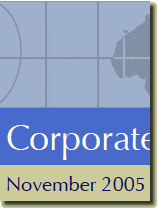 delves into the distant future, parting from a recent exercise of exploring CSR, ten years from now, that Allen White offers us in his essay Fade, Integrate or Transform? - The Future of CSR. delves into the distant future, parting from a recent exercise of exploring CSR, ten years from now, that Allen White offers us in his essay Fade, Integrate or Transform? - The Future of CSR.
The author first establishes that the future of market societies is not sustainable, for governments, which are suppose to be democratic, have partnered with big capital to pursue their very private interests and have abandoned their responsibility to procure the welfare of all ranks of society. Today, the goal of this partnership is to obsessively pursue, with a very short-term vision, the greatest possible shareholder value, regardless of the social, economic and environmental impact. Thus, the author foresees that this ethos will be radically transformed by society to build a new paradigm that, coinciding with White's third scenario, redefines the purpose of business
Yet, the author considers that redefining the end of business will require the complete redefinition of the purpose of democracy and its societies. The author argues that, given the pressing social and environmental decay, society will not allow the current ethos to prevail, and it is already seeking to build an ethos of real and direct democracy, participative and bottom up, that places social welfare above the private interest.
In this way, the future of CSR, as such, will disappear to assimilate itself to the paradigmatic shift in which social welfare becomes the primary purpose of business, governed by universal laws and standards that rule its activity. Yet, the author deems that this will not occur before the term of one generation, for building a truly democratic ethos entails redefining the pillars of society, from democracy, liberalism and the purpose of business to individualism, solidarity and the precedence of the community to create an entirely new culture for the 21st Century and beyond. Thus, this shift, which is already in motion, will be accomplished gradually as more and more people worldwide take conscience of the unsustainability of the current ethos and of the urgency to build a new paradigm to bequest to future generations.
Download our full issue essay here. TOP
TJSGA JOINS OECD WATCH

OECD Watch, which was established in March 2003 at a meeting in Amersfoort, Netherlands, groups together NGOs from Europe, the Americas, Australia, Africa and Asia who share a common vision about the need for corporate accountability and sustainable investment. The OECD Guidelines for Multinational Enterprises, which can neither impose sanctions nor offer compensation, are at present one of the few mechanisms available for holding companies to account. OECD WATCH is committed to testing the Guidelines as part of the wider NGO campaign towards binding regulation of multinationals. Members of OECD WATCH are committed to the following goals:
- Monitoring and contributing to the work of the OECD's Investment Committee;
- Testing the effectiveness of the OECD Guidelines for Multinational Enterprises as a corporate accountability tool;
- Disseminating information to civil society groups, particularly in developing countries, about the work of the Investment Committee on international investment, corporate governance and the OECD Guidelines;
- Advising NGOs about filing complaints against companies alleged to have breached the OECD Guidelines.
For further information about OECD Watch, visit their website by clicking here.
TOP
WAGE GAPS FOR SELECTED DEVELOPED AND "EMERGING" ECONOMIES FOR MANUFACTURING WORKERS (Updated from 1975 up to 2003)
Wage gaps between developed and emerging economies keep widening; Mexico shows the worst gap (84%) in purchasing power parities (PPPs) terms!
Workers performing the same or an equivalent job for the same business entity, in the generation of products and services that this 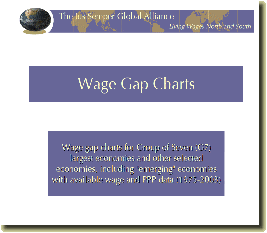 entity markets at global prices in the global market, must enjoy an equivalent remuneration. The premise is that workers must earn equal pay for equal work in terms of material quality of life for obvious reasons of social justice but also, and equally important, for reasons of global sustainability. There will not be any real progress in the sustainability of the market system -in all three economic, environmental and social dimensions- if there is no sustained generation of aggregate demand through the gradual closing of the wage gap between North and South. entity markets at global prices in the global market, must enjoy an equivalent remuneration. The premise is that workers must earn equal pay for equal work in terms of material quality of life for obvious reasons of social justice but also, and equally important, for reasons of global sustainability. There will not be any real progress in the sustainability of the market system -in all three economic, environmental and social dimensions- if there is no sustained generation of aggregate demand through the gradual closing of the wage gap between North and South.
This does not mean, whatsoever, that progress should be equivalent to the increase of irrational consumption, depleting all non-renewable resources. Eventually, during the twenty-first Century, a new paradigm must be built in which the purpose of the market is the welfare of all ranks of society, and the privileging of sustainability and not of capitalist accumulation. Yet, while that stage is reached, there is no justification at all, moral or economical, for the workers of the South not to earn wages equivalent to those of their counterparts in the North, in PPP terms, based on equal pay for equal work of equal market value. The blatant and perverse exploitation of workers in the South must be stopped.
The analysis is and update for 12 economies and the U.S., prepared by TJSGA, using 2003 hourly compensation costs for manufacturing workers as reported by the U.S. Department of Labour, and PPP data from the World Bank and the OECD. The report exposes once again a global labour system that profits over the majority of the people in favour of a global elite.
Download the pdf file with the wage gap 2003 update for 12 economies (Germany, France, Italy, Canada, U.K., Spain, Japan, South Korea, Singapore, Brazil, Hong Kong and Mexico) here.
TOP
THE WIDENING WAGE GAP (Table T4). (The base table used for all PPP wage gap analysis) In comparing 2003 against 2000, Canada and the European economies eliminated or further narrowed their wage gaps for equivalent work against the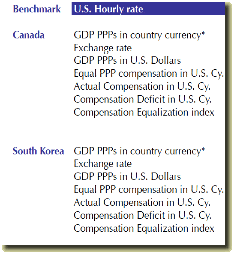 U.S. Japan and South Korea increased their wage gaps. Among other markets, Singapore, Honk Kong and Brazil showed little change, whilst Mexico maintained its trend of widening its wage gap. U.S. Japan and South Korea increased their wage gaps. Among other markets, Singapore, Honk Kong and Brazil showed little change, whilst Mexico maintained its trend of widening its wage gap.
Download the pdf file of Table 4 here.
TOP
MEXICO MAINTAINS THE TITLE OF WORST PERFORMER IN PURCHASING POWER OF MANUFACTURING WAGES In 2003, Mexico continues to have the worst real purchasing power parities (PPPs) wage, for it has the greatest equalized wage gap with the U.S. (84%), when compared against other emerging economies and against eight developed economies. In other words, a Mexican worker earns only 16% of the purchasing power (material quality of life) enjoyed by the equivalent U.S. counterpart. Even in Brazil's case -the most similar economy with available data- the wage gap is clearly less dramatic than in the Mexican case. Among Asian economies, all show higher nominal wages and smaller wage gaps than Mexico. South Korea, in particular, a country with a wage gap twice as large as Mexico's in 1975- is now at the same level than Japan with a gap of only 30% in 2003. This clearly exposes the sheer exploitative culture of both Mexican industrialists and foreign corporations, with the unrelenting support of the Mexican government. when compared against other emerging economies and against eight developed economies. In other words, a Mexican worker earns only 16% of the purchasing power (material quality of life) enjoyed by the equivalent U.S. counterpart. Even in Brazil's case -the most similar economy with available data- the wage gap is clearly less dramatic than in the Mexican case. Among Asian economies, all show higher nominal wages and smaller wage gaps than Mexico. South Korea, in particular, a country with a wage gap twice as large as Mexico's in 1975- is now at the same level than Japan with a gap of only 30% in 2003. This clearly exposes the sheer exploitative culture of both Mexican industrialists and foreign corporations, with the unrelenting support of the Mexican government.
Download the pdf file with the analysis of Mexico's wage gap here. TOP
THE STATE OF BRAZIL'S MANUFACTURING WAGES IS CLEARLY NEGATIVE AND CONTINUES TO WORSEN Since 1996, (first year with manufacturing wage comparable data available) Brazilian real wages lost 28% up to 2003 -relative to their PPP  equalization with the U.S. Prices drop with the 1999 crisis but wages do it even more, thus, real wages collapse in the span of seven years. In this way, the gap between nominal and PPP equalized wage deepens, growing from 53% to 66%. That is, although PPP cost of living drops from 69¢ to 36¢ against $1 dollar in the U.S., between 1996 and 2003, Brazilian PPP purchasing power drops from a 47 to a 34 index for, as in Mexico, employers increase price levels over wage levels. Although, in Brazil's case, the wage gap has not increased as dramatically as in Mexico (PPP equalization of 34 vs 16 in Mexico in 2003), a country with similar development, the situation after two decades of supply-side economics shows the same overwhelming features of pauperization of workers and their families in favour of employers, and there is no sign, whatsoever, of recovery." equalization with the U.S. Prices drop with the 1999 crisis but wages do it even more, thus, real wages collapse in the span of seven years. In this way, the gap between nominal and PPP equalized wage deepens, growing from 53% to 66%. That is, although PPP cost of living drops from 69¢ to 36¢ against $1 dollar in the U.S., between 1996 and 2003, Brazilian PPP purchasing power drops from a 47 to a 34 index for, as in Mexico, employers increase price levels over wage levels. Although, in Brazil's case, the wage gap has not increased as dramatically as in Mexico (PPP equalization of 34 vs 16 in Mexico in 2003), a country with similar development, the situation after two decades of supply-side economics shows the same overwhelming features of pauperization of workers and their families in favour of employers, and there is no sign, whatsoever, of recovery."
Download wage gap here.
TOP
SPAIN'S WAGE GAP IN 2003, REAL MANUFACTURING WAGES FOR SPAIN ALREADY RESEMBLE THOSE OF THE G7 COUNTRIES, WITH A PPP EQUALISATION WAGE GAP WITH THE U.S. OF ONLY 11%, NEAR THAT OF GREAT BRITAIN WITH ONLY 9% AND ABOVE JAPAN'S WAGE GAP OF 24%.
THE RESULTS OF SPAIN'S MEMBERSHIP IN THE EUROPEAN UNION SHOW A STARK CONTRAST WITH THE RESULTS OF MEXICO'S MEMBERSHIP IN NAFTA Since 1975, Spain's real wages improved 75% up to 2003 -relative to their equalization with the United States based on PPP- regardless of price levels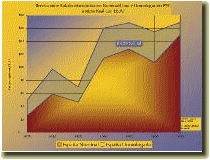 and exchange rate fluctuations during this period. In this way, the gap between nominal and equalized wages based on PPP is reduced in a sustained manner, dropping from 49% to 11%, amounting to a reduction of 78%. That is, between 1975 and 2003, Spanish nominal manufacturing wages increase 491%, from $2.53 to $14.96/hour, whilst the cost-of-living PPP index remains stable, moving from 78 a 77. As a result of the combination of the fact that nominal manufacturing wages in the U.S. grow only 245%, below Spain's wages, from $6.36 to $21.97/hour in the same period, and the cost-of-living PPP index is sustained, the PPP wage equalization increases to the level of 89%. and exchange rate fluctuations during this period. In this way, the gap between nominal and equalized wages based on PPP is reduced in a sustained manner, dropping from 49% to 11%, amounting to a reduction of 78%. That is, between 1975 and 2003, Spanish nominal manufacturing wages increase 491%, from $2.53 to $14.96/hour, whilst the cost-of-living PPP index remains stable, moving from 78 a 77. As a result of the combination of the fact that nominal manufacturing wages in the U.S. grow only 245%, below Spain's wages, from $6.36 to $21.97/hour in the same period, and the cost-of-living PPP index is sustained, the PPP wage equalization increases to the level of 89%.
To illustrate Spain's success, in 1975 Mexico and Spain had the same PPP cost-of-living index (78). Although, during the period of twenty-eight years, price levels behaved very different, twenty-eight years later they oscillate again within the same range (77 in Spain and 69 in Mexico). However, the entrance of Spain into the European Union and of Mexico into the North American Free Trade Agreement have drawn dramatically different results. The hard facts are that Spain's economic strategy gives sustained support to aggregate demand and Mexico's depresses it. While nominal manufacturing wages increase almost six fold in Spain, in Mexico they grow a meagre 69% -well below the growth of wages in the U.S., its main trading partner. Thus, the Spanish economy joins fully the group of developed economies whilst Mexico backtracks into poverty levels that precede, at the very least, the levels prevalent three decades ago.
Download the pdf file with the analysis of Spain's wage gap here.
TOP
COGNITERRA JOINS TJSG

CogniTerra is a non-profit organization established in March 2004 in Greece. Its major focal points are economic, socio-political, cultural and ICT development in the broader Mediterranean and South-Eastern European region.
CogniTerra has joined the Alliance to develop IBROMED, a joint program to advance TLWNSI (The Living Wages North and South Initiative) and SRI (Socially Responsible Investment) within a CSR framework in the Mediterranean region.
TOP
RESOURCE CENTRE
THE OECD GUIDELINES FOR MULTINATIONAL ENTERPRISES AND THEIR COMPLAINTS MECHANISM EARNED A RESOUNDING FLUNK EVALUATION BY OECD WATCH, A COALITION OF 50 NGOs FROM AROUND THE WORLD. OECD WATCH URGES THE CREATION OF A LEGALLY-BINDING MANDATORY FRAMEWORK
In full consensus with TJSGA's insistent advocacy of a mandatory CSR framework, OECD Watch also asserts, based on its recent findings, that 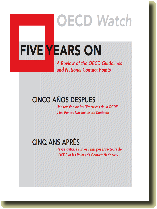 without the threat of effective sanctions, there is little incentive for companies to ensure their operations are in compliance with the Guidelines. Therefore, OECD Watch believes that governments must establish legally-binding, international social and environmental standards and corporate accountability frameworks. Indeed, from the TJSGA perspective, a voluntary CSR is only conducive to a complacent and merry practice of CSR, as a token of business practice, to be perceived as doing the public good without really doing it. without the threat of effective sanctions, there is little incentive for companies to ensure their operations are in compliance with the Guidelines. Therefore, OECD Watch believes that governments must establish legally-binding, international social and environmental standards and corporate accountability frameworks. Indeed, from the TJSGA perspective, a voluntary CSR is only conducive to a complacent and merry practice of CSR, as a token of business practice, to be perceived as doing the public good without really doing it.
Download the pdf of the full document here. (includes English, Spanish and French versions) TOP
PLEON SURVEY FINDS STAKEHOLDERS WANT MANDATORY CSR REPORTING OF BUSINESS PRACTICES, BUT COMPANIES KEY MOTIVATION RELATIVE TO CSR IS TO INCREASE THEIR REPUTATION AND NOT SOCIAL RESPONSIBILITY A recent survey among 495 stakeholders including the following backgrounds: employees, consultants, NGOs, the financial community, academics,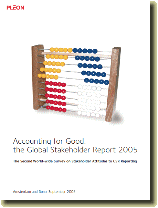 students, consumers, business associations and several others, conducted by Pleon in 58 countries around the world found that, albeit growing, only 25.3 percent oppose mandatory reporting whilst 72.5 percent support it. students, consumers, business associations and several others, conducted by Pleon in 58 countries around the world found that, albeit growing, only 25.3 percent oppose mandatory reporting whilst 72.5 percent support it.
Download the pdf of the full survey here.
TOP
FADE INTEGRATE OR TRANSFORM? - THE FUTURE OF CSR An exploration of CSR in the year 2015.
CSR is at a crossroads. After a decade of evolution, the pathway forward defies easy prognosis. Will external events and company choices relegate CSR to a passing fad, leading to its fading from corporate and public agendas? Or will CSR reach full fruition as it becomes aligned, integrated and fully institutionalized in company strategy and operations? Or, alternatively, is something more transformational on the horizon as CSR morphs into a deeper change mode, becoming a force for altering corporate purpose at the most fundamental and systemic level? These questions have profound implications for the future of all corporate enterprises. Exploring possible futures yields insight into where we find ourselves today and provides guidance about where we would like to be and how to get there. CSR to a passing fad, leading to its fading from corporate and public agendas? Or will CSR reach full fruition as it becomes aligned, integrated and fully institutionalized in company strategy and operations? Or, alternatively, is something more transformational on the horizon as CSR morphs into a deeper change mode, becoming a force for altering corporate purpose at the most fundamental and systemic level? These questions have profound implications for the future of all corporate enterprises. Exploring possible futures yields insight into where we find ourselves today and provides guidance about where we would like to be and how to get there.
Allen White performs an imaginative exploration of the future of CSR, for the year 2015, and ponders about three potential scenarios, which he intentionally designed with stark differences in content and implications for companies and their stakeholders. All scenarios are plausible, but which will - or should - materialize is not yet clear. His first vision is denominated the "fad-and-fade scenario"; a vision where CSR returns to its most superficial form in a failure of its own making. The second vision is labelled the "embed-and-integrate scenario", a more desirable outcome, according to the author. The last vision of "transition and transformation" ponders on the possibility of completely transforming the principles of capitalism to put social purpose as the pre-eminent goal, a far more desirable outcome.
Download the pdf of the full document here. TOP
HUMAN DEVELOPMENT REPORT 2005 OF THE UNDP SAYS THAT TIME IS RUNNING OUT!
The Report calls for swift and dramatic changes in global aid, trade and security policies to fulfil the promises made by the international community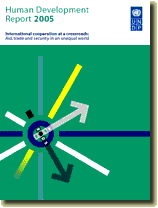 to address these problems five years ago. "The world has the knowledge, resources and technology to end extreme poverty, but time is running out". to address these problems five years ago. "The world has the knowledge, resources and technology to end extreme poverty, but time is running out". Download the pdf of the full report here TOP
CIVIL SOCIETY'S 2006 CALENDAR
- World Resource Institute: Transforming Transportation: Faster and Cleaner Breezes from Sustainable Urban Transport in Latin America, Washington, U.S., 22 January, 2006. Read more
- 2066 World Social Forum – Africa, Bamako, Mali, 19 - 23 January, 2006. Read more
- 2006 World Social Forum - Americas, Caracas, Venezuela, 24 - 29 January, 2006. Read more
- Responsibly Made in China? Chinese Development & Corporate Social Responsibility (CSR), Copenhagen, Denmark, 26 - 27 January, 2006. Read more
- Delhi Sustainable Development Summit 2006, New Delhi, India, 2 -4 February, 2006. Read more
- Third National Dialogue for an Alternative Project for the Nation, Mexico City, Mexico, 4 - 5 February, 2006. Read more
- United Students Against Sweatshops - WINTER CONFERENCE 2006, San Francisco, U.S., 9 - 12 February, 2006. Read more
- European Marches Against Unemployment, Job Insecurity and Social Exclusion - Mobilisation Against the Bolkestein Directive, 11 February, 2006. Read more
- The Impact of Globalization on Youth" Youth Conference, Lahore, Pakistan, 17 - 18 February 2006. Read more
- 3rd Annual Fair Trade Convergence, Denver, U.S., 17 - 19 February, 2006. Read more
- Corporate Social Responsibility Forum 2006, Sidney, Australia, 2 - 3 March, 2006. Read More
- Ethical Sourcing Forum, Driving Social and Environmental Impact, New York, U.S., 9 - 10 March, 2006. Read more
- 4th World Water Forum - Local Actions for a Global Challenge, Mexico City, México, 16 - 22 March, 2006. Read more
- Consumer Assembly - Consumer Federation of America, Washington U.S., 23 - 24 March 2006. Read more
- 2006 World Social Forum - Asia, Karachi, Pakistan, 24 - 29 March, 2006. Read more
- CERES Conference 2006: Accelerating Sustainable Governance, Oakland, U.S., 5 - 6 April, 2006. Read more
- International Sustainable Development Research Conference, Hong Kong, China, 6 - 8 April, 2006. Read more
- The Trans-Atlantic Consumer Dialogue - Conference on Intellectual Property disputes of the future, Washington, U.S., 27 - 28 April, 2006. Read more
- International Conference on Environmental Management and Innovation, Vienna, Austria, 28 - 29 April, 2006. Read more
- European Social Forum, Athens, Greece, April, 2006. Read more
- Health, Development and Poverty Conference, Montreal, Canada, 21 - 24 April, 2006. Read more
- Cities and Quality of Life, Geneva, Switzerland, 18 - 20 May, 2006. Read more
- Power, Poverty and Sustainability: The Role of Impact Assessment, 26th Annual Conference of AIA, Stavanger, Norway, 23 - 26 May, 2006. Read more
- ILO's 95th International Labour Conference, Geneva Switzerland, 31 May - 16 June, 2006. Read more
- Sixth CIVICUS World Assembly Acting Together for a Just World, Glasgow, Scotland, 21 - 26 June, 2006. Read more
- 2006 Asia-Pacific Coop Conference, Quezón, Philippines, 6 - 7 July, 2006. Read more
- 13th Conference of the International Association for the Economics of Participation (IAFEP): Expanding Democratic Firms, Broadening Economic Democracy, Mondragón, Spain, 13 - 15 July, 2006. Read more
- The Sustainable City 2006, Tallinn, Estonia, 17 - 19 July, 2006. Read more
- Seventh International Conference on Ethics and International Development, Kampala, Uganda, 19 - 22 July, 2006. Read more
- The Ravage of the Planet 2006 - First International Conference on Management of Natural Resources, Sustainable Development and Ecological Hazards, Bariloche, Argentina, 12 - 14 December, 2006. Read more
TOP
CORPORATE 2006 CALENDAR - Conference Board Conference: Meeting Expectations in the Business & Society Relationship, Brussels, Belgium, 11 - 12 January 2006. Read more
- World Economic Forum Annual Meeting, Davos, Switzerland, 25 - 29 January, 2006. Read more
- The 7th Global Civil Society Forum, prior to the 9 th Special Session of the Governing Council/Global Ministerial Environment Forum, Dubai, Arab Emirates, 5 - 6 February, 2006. Read more
- Sustainable Development and the WTO, London, UK, 6 - 7 February, 2006. Read more
- Centre for Corporate Citizenship at Boston College: Evaluation and Measurement, San Diego, U.S., 8 - 10 February, 2006. Read more
- The 2006 Leadership Conference on Global Corporate Citizenship, New York, U.S. 16 - 17 February, 2006. Read more
- World Council for Corporate Governance - Global Conference on Social Responsibility, Vilamoura, Portugal, 16 - 18 February, 2006. Read more
- CSR in an Enlarged Europe, Brussels, Belgium, 20 February, 2006. Read more
- Debate on the Role of Business in Tomorrow's Society, Geneva Switzerland, 20 February, 2006. Read more
- How to manage CSR in Asia, Hong Kong, China, 22 - 23 February, 2006. Read more
- Corporate Branding & Reputation Conference, Singapore, 2 - 3 March, 2006. Read more
- Ernst & Young Reporting on Sustainability Performance in Supply Chains, Johannesburg on 8 March and in Cape Town on 9 March, 2006, South Africa. Read more
- Ethical Sourcing Forum, New York, U.S., 9 - 10 March, 2006. Read More
- Corporate Responsibility 2006 - Emerging Risks and Evolving Responsibilities, London, UK, 13 - 14 March, 2006. Read more
- International Forum on Solidarity Tourism and Fair Trade, Tuxtla Gutierrez, Mexico, 23 - 27 March, 2006. Read More
- Centre for Corporate Citizenship at Boston College: International Annual Conference, Orlando, U.S., 26 - 38 March, 2006. Read more
- Business and NGO Partnerships, London, UK, 28 - 29 March, 2006. Read more
- 9th Biennial Trade Fair & Conference on Business & the Environment, Vancouver, Canada, 29 - 31 March, 2006. Read more
- CSR: Agendas for Asia Conference, Kuala Lumpur, Malaysia, 13 - 14 April, 2006. Read more
- Africa - Drivers of Change, Wilton Park, UK, 24 - 27 April , 2006. Read more
- 5th International Conference on Corporate Social Responsibility and Accounting, Finance and Regulation, Trakya University, Edirne, Turkey, 1 -4 May, 2006. Read more
- 14th Session of the UN Commission on Sustainable Development, New York, U.S., 1 -12 May, 2006. Read more
- Triple Bottom Line Investing Conference 2006, Bangkok, Thailand, May, 2006. Read more
- Beyond CSR? Business, Poverty and Social Justice, Warwick University, London, UK, 22 May, 2006. Read more
- OECD Forum, Paris, France, 22 - 23 May, 2006. Read more
- Ethical Corporation Europe's Summit 2006: Leading from the top: How to embed ethical values within your organisation, London, UK, 31 May - 1 June, 2006. Read more
- Reducing Poverty - The Role of Parliaments, Governments and Non-State Actors, Wilton Park, UK, 5 - 8 June, 2006. Read more
- Political Change in Latin America: Implications for the Region, EU, U.S. and Asia-Pacific, Wilton Park, UK, 15 - 18 June, 2006. Read more
- Sustainability and Beyond: The Emerging Triple Bottom Line of the New Economy, Charlottesville, U.S., 19 - 22 June, 2006. Read more
- World Urban Forum, Vancouver, Canada, 19 -23 June, 2006. Read more
- The 2006 Business & Sustainable Development Conference, Washington, U.S., 21 - 22 June, 2006. Read more
- Seventeenth Conference of the European Bahai'I Business Forum EBBF: Leadership for a Sustainable World Order, The Role of Business, De Poort, Netherlands, 21 - 24 September 2006. Read more
- 2006 Annual Meetings of the World Bank Group and IMF, Singapore, 24 - 25 September, 2006. Read me
- SRI (Socially Responsible Investment) Annual Conference, Colorado Springs, U.S, 28 - 31 October, 2006. Read more.
- Triple Bottom Line Investing Conference 2006, Paris, France, November, 2006. Read more
- Business for Social Responsibility Annual Conference, Washington, U.S., 7 - 10 November, 2006. Read more.
- China: the Risks, the Opportunities, Wilton Park, UK, 13 - 16 November, 2006. Read more
- Asia-Pacific Economic Cooperation (APEC) CEO Forum, Hanoi, Vietnam, 17 - 19 November, 2006. Read more
TOP
TOP RESOURCE DOWNLOADS Following are the top ten internal and external information resources downloaded from our website in the previous semester. Below the chart are the links for each resource if you want to download them: 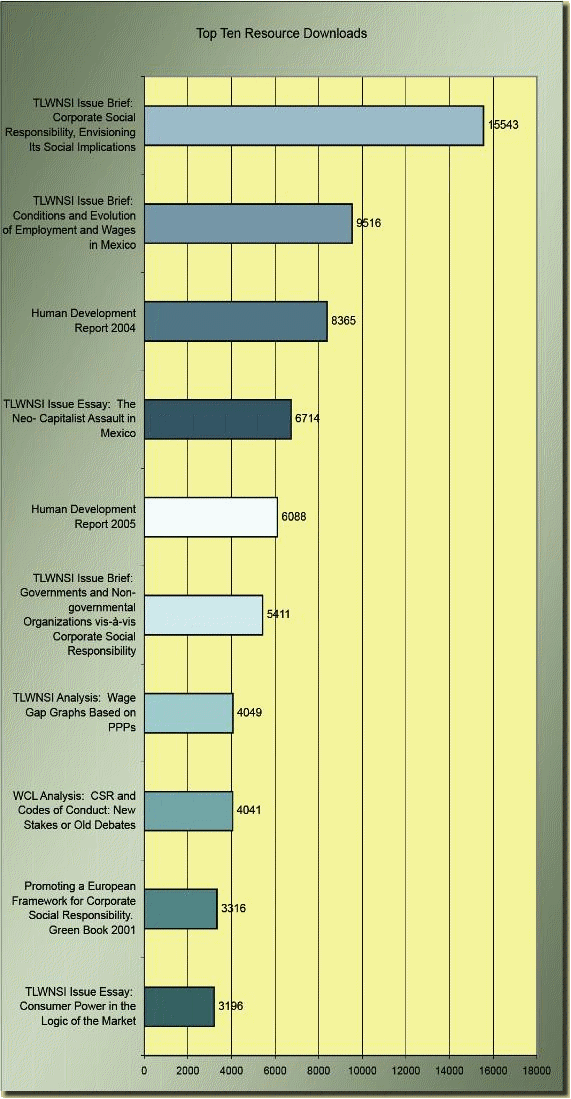
To download click below: 1.TLWNSI Issue Brief: Corporate Social Responsibility, Envisioning Its Social Implications
2.TLWNSI Issue Brief: Conditions and Evolution of Employment and Wages in Mexico
3.Human Development Report 2004
4.TLWNSI Issue Essay: The Neo-Capitalist Assault in Mexico
5.Human Development Report 2005
6.TLWNSI Issue Brief: Governments and Non-governmental Organizations vis-à-vis Corporate Social Responsibility
7.TLWNSI Analysis: Wage Gap Graphs based on PPPs
8.WCL Analysis: CSR and Codes of Conduct: New Stakes or Old Debate?
9.Promoting a European Framework for CSR. Green Book (2001)
10.TLWNSI Issue Essay: Consumer Power inb the Logic of the Market
Thank you so much for your support. If you have any questions or comments, Please e-mail us: gsc@jussemper.org
If you are not a member of our eCommunity yet, please click here to sign up for TJSGA's eCommunity to receive our quarterly newsletter. If you do not wish to continue receiving our quarterly newsletter, just e-mail us writing in the subject "unsubscribe" nosuscrip@jussemper.org.
TOP |  |





 delves into the distant future, parting from a recent exercise of exploring CSR, ten years from now, that Allen White offers us in his essay Fade, Integrate or Transform? - The Future of CSR.
delves into the distant future, parting from a recent exercise of exploring CSR, ten years from now, that Allen White offers us in his essay Fade, Integrate or Transform? - The Future of CSR.
 entity markets at global prices in the global market, must enjoy an equivalent remuneration. The premise is that workers must earn equal pay for equal work in terms of material quality of life for obvious reasons of social justice but also, and equally important, for reasons of global sustainability. There will not be any real progress in the sustainability of the market system -in all three economic, environmental and social dimensions- if there is no sustained generation of aggregate demand through the gradual closing of the wage gap between North and South.
entity markets at global prices in the global market, must enjoy an equivalent remuneration. The premise is that workers must earn equal pay for equal work in terms of material quality of life for obvious reasons of social justice but also, and equally important, for reasons of global sustainability. There will not be any real progress in the sustainability of the market system -in all three economic, environmental and social dimensions- if there is no sustained generation of aggregate demand through the gradual closing of the wage gap between North and South.  U.S. Japan and South Korea increased their wage gaps. Among other markets, Singapore, Honk Kong and Brazil showed little change, whilst Mexico maintained its trend of widening its wage gap.
U.S. Japan and South Korea increased their wage gaps. Among other markets, Singapore, Honk Kong and Brazil showed little change, whilst Mexico maintained its trend of widening its wage gap. when compared against other emerging economies and against eight developed economies. In other words, a Mexican worker earns only 16% of the purchasing power (material quality of life) enjoyed by the equivalent U.S. counterpart. Even in Brazil's case -the most similar economy with available data- the wage gap is clearly less dramatic than in the Mexican case. Among Asian economies, all show higher nominal wages and smaller wage gaps than Mexico. South Korea, in particular, a country with a wage gap twice as large as Mexico's in 1975- is now at the same level than Japan with a gap of only 30% in 2003. This clearly exposes the sheer exploitative culture of both Mexican industrialists and foreign corporations, with the unrelenting support of the Mexican government.
when compared against other emerging economies and against eight developed economies. In other words, a Mexican worker earns only 16% of the purchasing power (material quality of life) enjoyed by the equivalent U.S. counterpart. Even in Brazil's case -the most similar economy with available data- the wage gap is clearly less dramatic than in the Mexican case. Among Asian economies, all show higher nominal wages and smaller wage gaps than Mexico. South Korea, in particular, a country with a wage gap twice as large as Mexico's in 1975- is now at the same level than Japan with a gap of only 30% in 2003. This clearly exposes the sheer exploitative culture of both Mexican industrialists and foreign corporations, with the unrelenting support of the Mexican government. equalization with the U.S. Prices drop with the 1999 crisis but wages do it even more, thus, real wages collapse in the span of seven years. In this way, the gap between nominal and PPP equalized wage deepens, growing from 53% to 66%. That is, although PPP cost of living drops from 69¢ to 36¢ against $1 dollar in the U.S., between 1996 and 2003, Brazilian PPP purchasing power drops from a 47 to a 34 index for, as in Mexico, employers increase price levels over wage levels. Although, in Brazil's case, the wage gap has not increased as dramatically as in Mexico (PPP equalization of 34 vs 16 in Mexico in 2003), a country with similar development, the situation after two decades of supply-side economics shows the same overwhelming features of pauperization of workers and their families in favour of employers, and there is no sign, whatsoever, of recovery."
equalization with the U.S. Prices drop with the 1999 crisis but wages do it even more, thus, real wages collapse in the span of seven years. In this way, the gap between nominal and PPP equalized wage deepens, growing from 53% to 66%. That is, although PPP cost of living drops from 69¢ to 36¢ against $1 dollar in the U.S., between 1996 and 2003, Brazilian PPP purchasing power drops from a 47 to a 34 index for, as in Mexico, employers increase price levels over wage levels. Although, in Brazil's case, the wage gap has not increased as dramatically as in Mexico (PPP equalization of 34 vs 16 in Mexico in 2003), a country with similar development, the situation after two decades of supply-side economics shows the same overwhelming features of pauperization of workers and their families in favour of employers, and there is no sign, whatsoever, of recovery." and exchange rate fluctuations during this period. In this way, the gap between nominal and equalized wages based on PPP is reduced in a sustained manner, dropping from 49% to 11%, amounting to a reduction of 78%. That is, between 1975 and 2003, Spanish nominal manufacturing wages increase 491%, from $2.53 to $14.96/hour, whilst the cost-of-living PPP index remains stable, moving from 78 a 77. As a result of the combination of the fact that nominal manufacturing wages in the U.S. grow only 245%, below Spain's wages, from $6.36 to $21.97/hour in the same period, and the cost-of-living PPP index is sustained, the PPP wage equalization increases to the level of 89%.
and exchange rate fluctuations during this period. In this way, the gap between nominal and equalized wages based on PPP is reduced in a sustained manner, dropping from 49% to 11%, amounting to a reduction of 78%. That is, between 1975 and 2003, Spanish nominal manufacturing wages increase 491%, from $2.53 to $14.96/hour, whilst the cost-of-living PPP index remains stable, moving from 78 a 77. As a result of the combination of the fact that nominal manufacturing wages in the U.S. grow only 245%, below Spain's wages, from $6.36 to $21.97/hour in the same period, and the cost-of-living PPP index is sustained, the PPP wage equalization increases to the level of 89%.
 without the threat of effective sanctions, there is little incentive for companies to ensure their operations are in compliance with the Guidelines. Therefore, OECD Watch believes that governments must establish legally-binding, international social and environmental standards and corporate accountability frameworks. Indeed, from the TJSGA perspective, a voluntary CSR is only conducive to a complacent and merry practice of CSR, as a token of business practice, to be perceived as doing the public good without really doing it.
without the threat of effective sanctions, there is little incentive for companies to ensure their operations are in compliance with the Guidelines. Therefore, OECD Watch believes that governments must establish legally-binding, international social and environmental standards and corporate accountability frameworks. Indeed, from the TJSGA perspective, a voluntary CSR is only conducive to a complacent and merry practice of CSR, as a token of business practice, to be perceived as doing the public good without really doing it. students, consumers, business associations and several others, conducted by Pleon in 58 countries around the world found that, albeit growing, only 25.3 percent oppose mandatory reporting whilst 72.5 percent support it.
students, consumers, business associations and several others, conducted by Pleon in 58 countries around the world found that, albeit growing, only 25.3 percent oppose mandatory reporting whilst 72.5 percent support it.  CSR to a passing fad, leading to its fading from corporate and public agendas? Or will CSR reach full fruition as it becomes aligned, integrated and fully institutionalized in company strategy and operations? Or, alternatively, is something more transformational on the horizon as CSR morphs into a deeper change mode, becoming a force for altering corporate purpose at the most fundamental and systemic level? These questions have profound implications for the future of all corporate enterprises. Exploring possible futures yields insight into where we find ourselves today and provides guidance about where we would like to be and how to get there.
CSR to a passing fad, leading to its fading from corporate and public agendas? Or will CSR reach full fruition as it becomes aligned, integrated and fully institutionalized in company strategy and operations? Or, alternatively, is something more transformational on the horizon as CSR morphs into a deeper change mode, becoming a force for altering corporate purpose at the most fundamental and systemic level? These questions have profound implications for the future of all corporate enterprises. Exploring possible futures yields insight into where we find ourselves today and provides guidance about where we would like to be and how to get there. to address these problems five years ago. "The world has the knowledge, resources and technology to end extreme poverty, but time is running out".
to address these problems five years ago. "The world has the knowledge, resources and technology to end extreme poverty, but time is running out".


